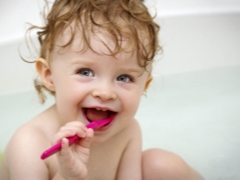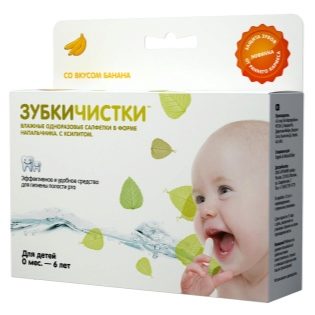When to start brushing your child's teeth?
Every adult person pays enough attention to brushing his own teeth, but when the teeth begin to cut in a child of the first year of life, many are lost and do not know whether babies need brushing up to a year, how to properly clean baby teeth and what hygiene products to choose for children.
Rationality of early oral hygiene
The opinion that the first teeth, called milky, do not require cleaning, is deeply mistaken. If you do not pay attention to the care of baby teeth, the risk of caries in babies increases many times. This is primarily due to the lower strength of enamel in temporary teeth. In addition, the nutrition of young children is quite a lot of carbohydrates (they are contained in breast milk and milk formula), which are a source of food for bacteria that provoke caries.
If you do not clean your teeth in time and do not remove the remnants of food and accumulated plaque from the mouth of babies, the bacteria will develop more actively and the risk of caries will increase.

In addition, the early manifestations of caries in the form of white spots often remain unnoticed in children. The disease spreads freely into the dental tissue, and when the teeth begin to hurt, familiarity with the dentist will be a serious challenge for the child’s psyche.
The lack of cleaning and the rapid development of caries cause the loss of milk teeth, which threatens permanent teeth. The infection can go to their beginnings, and a molar tooth just erupted will have to be treated by a dentist. There are also frequent dislocations of teeth, which, at an older age, will have to be fixed with plates or braces to avoid ridicule from peers and problems with chewing. As you can see, the importance of hygiene milk bite is really great.

When and at what age is it better to start brushing your teeth?
The age period in which a particular child needs to begin to clean the teeth will be individual for each baby, because the teeth erupt in different children in different ways. The general recommendation for all babies will be to start brushing their teeth from the moment when the first incisor “hooked”.
For most babies, this happens at the age of 6-8 months, but for some babies, the first clove can erupt into 3-4 months, and for some, the first tooth appears at 11-12 months.
Since by the year almost all babies have at least one tooth, the question “should a one-year-old child brush their teeth?” Has only one answer - “necessarily”.
It is important to note that at the time of eruption of local immunity in the mouth of the crumbs is reduced, and the inflamed gums react to contact with any objects rather painfully. therefore Clean the cutting teeth need very carefully.
Some dentists insist on an earlier start of cleaning the mouth of children - even before the eruption of the first tooth. They explain this by the ingestion of milk and complementary foods in the infant’s mouth, as a result of which microorganisms accumulate on the mucous membrane even in the absence of teeth. In their opinion, start to care for the gums should be from three to four months of age. This will help develop the habit of caring for teeth. In addition, the little ones at this age do not react negatively to the brush.
The opinion of Dr. Komarovsky regarding how old to start brushing your baby’s teeth is in the video:
How to clean?
If the baby has not yet had a single tooth, cleaning is just wiping the tongue and gums. The very first teeth are also simply wiped, since even the use of the softest brush will be painful for the crumbs. To wipe your baby’s teeth, you can use:
- A piece of bandage or gauze dipped in boiled water.
- Napkins "Zubkichistki."
- Dental napkins "Spiffies".
Water that is moistened with gauze can be slightly salted. Vatu for wiping do not use, as it is not enough rough material, which, moreover, can leave fibers in the mouth of the baby.
Special wipes for wiping the mouth of the children soaked xylitolrepresenting a safe antiseptic. They protect the oral cavity from thrush and caries, relieve pain. Napkins can be tasteless or have a pleasant mint, banana, apple or grape flavor. The disadvantage of such wipes is only their high cost, since they are disposable.
From the age of 6 months, when the ejection reflex is gone, they begin to use either a silicone fingertip for cleaning, or a classic brush in the children's version - with a short handle and soft bristles, as well as with a small area of the cleaning surface. More often a brush worn on a finger is used until the age of one, and the usual brush is bought for children over a year old.
To the toddler learned to properly clean the teeth, you should act gradually:
- At 6-8 months of age baby familiar with the brush and allow you to get used to its use.
- Ages 8 to 12 months the child is shown the correct movements when brushing their teeth.
- From 1 year to 3 years old the baby is taught thorough tooth cleaning.
The frequency of cleaning the child's teeth - twice a day. In this evening cleansing, performed before bedtime, is more important than that carried out in the morning, so we should not forget about it. The duration of each procedure is about 2-3 minutes, although the first cleaning may be less long, while the baby gets used to the manipulation.
Follow these rules:
- The brush should be placed at the child's teeth at an angle of 45 °.
- Brush movements should be in the direction from the gums to the cutting edge.
- Cleaning should be done both on the inside and the outside of each tooth.
- For cleansing the chewing surface, use progressive circular motions.
- At the end of the procedure, the back of the brush clears the tongue.
Clearly, the procedure for brushing your teeth is shown in the video from the channel. MJmelka:
At what age can a baby brush teeth?
Offer your child to pick up a brush and try to brush their teeth on their own from the age of one. Consider that at the age of three years the child is still unable to clean the teeth properly, therefore after his attempts at self-cleaning, the parents will have to brush the teeth additionally again. However, it is important to maintain the desire of the toddler to brush his teeth himself.
How to teach a child to brush their own teeth?
Teaching kids how to handle a toothbrush is best on their own parents' example, because kids love to imitate the actions of adults.
A mirror can also help in learning.therefore during the cleaning, give the child the opportunity to look at his reflection. So the baby will be able to better control their actions and observe the movement of the brush in the mouth.
Tell and show your child that brushing your teeth with toothpaste should be this way:
- Rinse your mouth with warm water before the procedure.
- Squeeze a little toothpaste onto the brush (no more than a pea).
- Clean the external, chewing and internal surfaces of all teeth.
- Brush your tongue.
- Rinse the mouth well with warm water.
- Rinse the brush under the faucet and put it in a glass head up.
What if the baby refuses to brush his teeth?
Many children at first treat the toothbrush negatively, since it is a foreign object that can cause discomfort to the baby. If the child is not too well-tuned to brushing his teeth, one should not abandon attempts to accustom the baby to oral hygiene.
Every day, offer the baby to clean the teeth. Also try cleaning with different brushes and different pastes.
To interest the child, brushing your teeth can be made more interesting:
- While the baby cleans teeth, sing a song or read a poem.
- Make the cleaning procedure a “secret assignment” during which the child resists the caries bacteria.
- Take your favorite toy to the bathroom.
- To arrange a speeding competition in which parents, of course, will succumb.
- Include a program on the phone in which a funny hero will brush his teeth along with the child.
Another way how to play to teach a child to brush their teeth, look in the video:
Toothpaste selection
Pick up the paste for the child should be based on the age of the toddler. As a rule, begin to use toothpaste in cleaning children's teeth no earlier than 2 years of age. Usually pastes for young children are represented by a gel form. In such pastes are abrasive particles, and the taste is often fruity.
Remember that pastes for children under 3 years old should not include fluoride, since, due to the inability to rinse your mouth well, this element will get into the child's digestive tract and have a toxic effect. Fluorine-containing paste is permissible to buy only when the child has learned to rinse out his mouth and spit out the paste.
Useful tips
- Do not allow baby toothbrush contamination - weekly wash it in hot water and replace the brush after two to three months of use. If the child is sick, the brush should also be replaced with a new one.
- Regularly go with the child to the dentist, even if, in your opinion, the crumbs are in perfect order. The doctor can identify problems at the stage when they are almost invisible to parents. At the same time, their treatment will not give the child such discomfort as tooth diseases detected out of time.
Look together with the baby cartoon pro teeth care. An interested baby will clean them and visit the dentist with pleasure, and together you will keep baby teeth healthy for a long time!
















